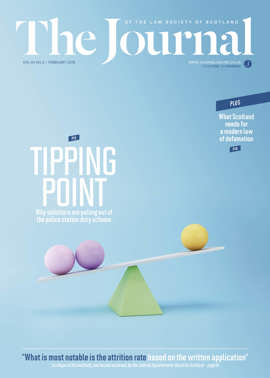LBTT's birthday alert

Sunday, 1 April 2018 is the third anniversary of the introduction of land and buildings transaction tax (LBTT). On this date a unique feature of the LBTT regime will kick into gear for the very first time, namely the three-year lease review mandatory returns cycle. Are you (and your clients) ready?
Under the Land and Buildings Transaction Tax (Scotland) Act 2013, the LBTT regime replaced stamp duty land tax (SDLT) in Scotland. Leases are treated differently to a purchase of land and/or buildings for LBTT purposes.
Leases, by their nature, are often subject to many more changes in circumstance than a property purchase. Leases may be varied, the rent may fluctuate and tenants may assign their interests or terminate the lease. There may also be periods where the tenant occupies the property by operation of tacit relocation.
Tenants’ obligation
A key difference between the SDLT and LBTT regimes in respect of leases is that a tenant of a non-residential property in Scotland has an ongoing obligation to notify Revenue Scotland of certain circumstances throughout the full term of the lease. This updates Revenue Scotland on a regular basis in respect of any change to the lease, and, importantly, any change to the chargeable consideration payable in terms of it.
Such tenants must submit further mandatory returns to Revenue Scotland in respect of any lease which was subject to LBTT on its original grant, or which became subject to LBTT due to the operation of the transitional rules (designed to bring SDLT leases gradually into the LBTT regime: Land and Buildings Transaction Tax (Transitional Provisions) (Scotland) Order 2014, and likely to remain relevant for some time), at three “trigger” points in the life of their lease:
- every three years on the anniversary of the original “effective date” of the lease;
- on termination of the lease (for any reason); and
- on assignation of the lease.
The policy intention is to ensure that the actual value of a lease throughout its lifetime is reflected in the total amount of LBTT paid over the full term of the lease.
Although practitioners may well have started to become familiar with the submission of returns on the grant of a lease and on termination or assignation of an LBTT lease, it will only be from 1 April 2018 that the first three-year lease review returns will fall due by tenants to Revenue Scotland. It remains to be seen how tenant clients, practitioners and Revenue Scotland all cope.
Recalculation
It is emboldening to know that in the face of this onslaught of change, the Law Society of Scotland’s LBTT working group (led by Isobel d’Inverno) has been meeting with Revenue Scotland regularly with a view to guiding and shaping the introduction of this new process. The working group continues to lobby for change, clarify guidance and to raise and resolve technical LBTT (and ADS – additional dwelling supplement) related queries and anomalies.
Three-year lease review returns must be submitted to Revenue Scotland within 30 days of every third anniversary of the effective date. Submission of a return every three years throughout the full term of the lease is mandatory, even where there has been no change to the lease or no further tax is payable. The reporting requirement includes periodic review, and revision if necessary, of the original tax calculation to take into account changes throughout the life of the lease, such as any estimated, contingent or fluctuating rental amounts in the preceding three-year period (including any RPI rent review increases together with an assessment of projected rents). It will be important to consider other changes to the lease, not just the value of rents paid in terms of the contract. Care should, therefore, be taken in preparing each return or guiding clients on this.
However, it is also clear that there is the potential for a tenant, on recalculation of tax actually paid under the lease (e.g. on estimated or contingent rents), to receive a refund for any tax overpaid in respect of the preceding three-year period. Similarly a repayment of LBTT can also be sought where a lease terminates early.
Higher penalties
Failure to make the required returns, and/or late payment of any LBTT due, will result in penalties and interest being applied (even where the return will report no change in circumstances or where no further tax is payable). It is notable that penalties under the LBTT regime are significantly higher than under SDLT. Penalties of £100 are incurred if the return is one day late, and if the return is up to six months late the penalty can be up to £1,000, with tax-geared penalties applying beyond six months. Additional tax-geared penalties and interest may also be applied for late payment of any LBTT arising.
Assignations
Revenue Scotland is clear that the responsibility for compliance with three-year returns rests with the tenant. This has important ramifications, particularly in respect of assignations. An assignee/tenant under a notified lease is deemed to have taken on the responsibilities of the previous tenant. The three-year return will be due based on the effective date of the original LBTT lease. Calculations of LBTT should continue to be made with reference to the rates and bands in force at the time of the original effective date – something that may become more important as we continue through multiple three-year cycles. Any recalculation will necessarily require reference to the original LBTT calculations.
Reminders: only a gesture
In general, we are likely to face an increase in tenant clients contacting us to seek information and assistance, so it is worth preparing accordingly. Checking the terms of the original engagement letter and the basis of submission of the original LBTT return on behalf of your tenant client is advisable.
Revenue Scotland intends to send out reminders prior to the third anniversary of non-residential tenancies, based on the details held on its system. These reminders will direct tenants to an online facility to submit their three-year lease returns using unique reference numbers that will tie the return to the original LBTT return.
Revenue Scotland is clear that the reminders should be treated as a one-off gesture of goodwill and such reminders will not be rolled out indefinitely. Failure to receive such a reminder will not constitute a reasonable excuse for submitting a late return and Revenue Scotland reserves the right to impose late-filing penalties.
The precise form of return is yet to be fully revealed. However, Revenue Scotland is piloting a form and has advised that it is working on the creation of a user-friendly online platform to ensure that compliance is as simple as possible for tenants. This will be ready for 1 April 2018.
Revenue Scotland expects 5,000 three-year review returns to be submitted in 2018, and the first reminder letters will shortly be en route to tenants. It will be April before we know it!
A view from the Revenue
Revenue Scotland comments on the arrival of the three-year review
The review, which will apply to most LBTT leases, is a legal requirement resulting from the LBTT (Scotland) Act 2013. Under the Act, tenants are required to submit a further return to Revenue Scotland every three years that reviews the lease and assesses whether the correct amount of tax has been paid.
Head of tax operations Chris Myerscough explains the background: “During the LBTT Bill process, the Scottish Government established a working group to look at options for taxing leases in a way which would be better aligned to Scottish property law and would ensure that tenants pay the correct amount of tax over the term of the lease.
“As a result, the legislation includes a requirement for the tenant in a lease which has been subject to an LBTT return to submit a further return following every third anniversary of the lease, with the first review date being 1 April 2018.
“These further returns will inform Revenue Scotland of any changes that have occurred since the last LBTT return was submitted and enable a review of the amount of tax chargeable over the lifetime of the lease.”
A further return is also required when a lease is assigned or terminated (whether that is before the end of the agreed term or on the natural expiry of the lease).
The tenant is responsible for submitting the review return and paying any additional tax due. The requirement to file a further LBTT return applies even if there have been no changes to the lease, or if no additional tax is payable. A repayment may be claimed if less tax is due than has been paid.
The review return must be submitted to Revenue Scotland within 30 days of the third anniversary, the assignation or the termination of the lease. Late returns will incur a penalty and will be subject to Revenue Scotland’s existing penalty processes.
Revenue Scotland has developed a new LBTT return to make it as easy as possible to submit the review return. Users of the Scottish Electronic Tax System (SETS) will be able to submit this online from 1 April 2018 and, for the first time, tenants will also be able to file their own review return online.
Revenue Scotland will be writing to tenants three months in advance of the first three-year anniversary of their lease to remind them of the requirement to file a return. Guidance, FAQs and worked examples are available at www.revenue.scot
In this issue
- Enforceable rights or progressive policy goals?
- Data processors beware: GDPR holds you responsible too
- Insolvency in a post-Carillion world
- Employee ownership: a strategy that fits
- A mediation Act? The Irish experience
- Journal magazine index 2017
- Reading for pleasure
- Opinion: Andrew Tickell
- Book reviews
- Profile
- President's column
- Digital progress given go ahead
- People on the move
- Tipping point for legal aid?
- Arrest: all change
- Legal software: are you still listening to Gangnam style?
- Defamation law for the digital age
- Choosing our judges: could we do it better?
- A journey through trust compliance
- The Cashroom: 10 years of service
- From dockets to defences
- Sex discrimination runs deep
- Wealth not a bar to s 28 claims
- No spying on the job
- Scottish Solicitors Staff Pension Fund: not the final instalment?
- Scottish Solicitors' Discipline Tribunal
- The Clark Foundation for Legal Education
- LBTT's birthday alert
- Doing all the white stuff
- Solicitor's CBE for life of service
- From the Brussels office
- Paralegal pointers
- Public policy highlights
- The kindest cut
- Wish list for the review
- Benchmarking: take the benefits
- Tax evasion: don't get caught up
- Ask Ash
- Time to call out harassment
- Q & A corner






